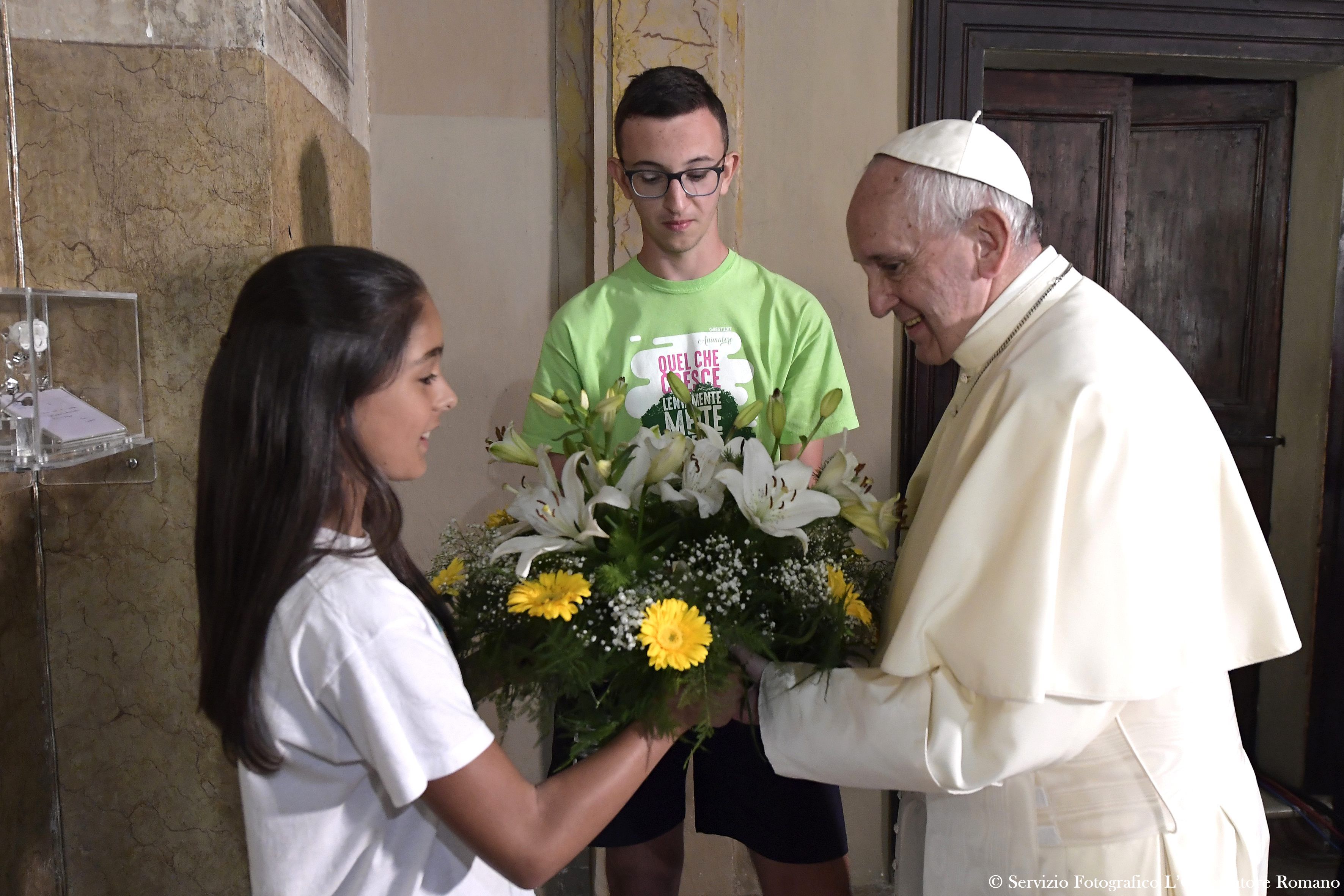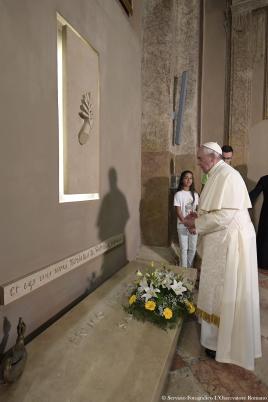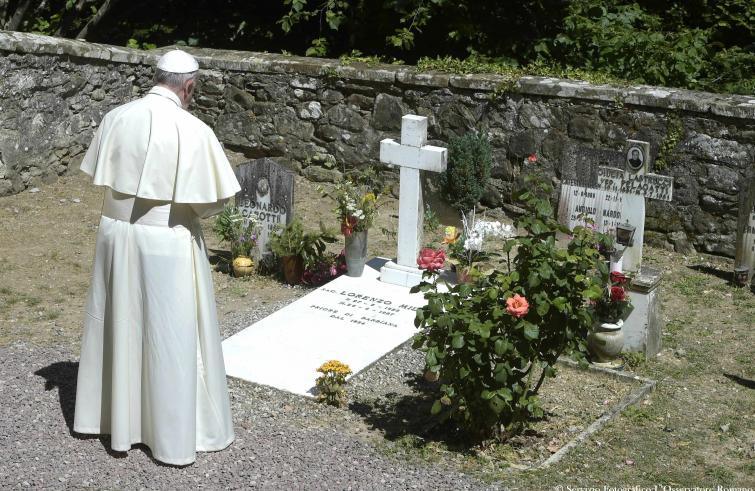Bozzolo and Barbiana
“They saw far: if we had followed them we would have been spared suffering and humiliation”: Bergoglio prayed on the tombs of the two parish priests described as “disobedient” on many occasions while they were simply and steadfastly faithful to the message of Jesus. Their biographies outline the profile of the priest who walks together with his community, at the service of the poor and of those who are far, with an educational commitment and with a spiritual message that continues to thrive still today

Bozzolo and Barbiana, Don Primo Mazzolari and Don Lorenzo Milani. Two realities at the margins of the centres of power and prestige, two marginalized voices – owing to their vocation to live the Gospel embodied in history. For the two Italian priests this meant giving back the word to the poor, engaging in dialogue with those who were far in years of conflicts and excommunications, denouncing the folly of war before John XXIII’s Pacem in Terris. Those decisions were not appreciated at a time when it was believed that conformism and uniformity were essential to the spread of the Christian faith. There were also – partially unsuccessful – attempts to silence their voices with hammering, painful censorship.
 On Tuesday June 20, as he gathered to pray on the tombs of Fr Mazzolari and Fr Milani, Pope Francis identified in the priests from the Italian provinces of Cremona and Florence – often branded as “disobedient” by friends and opponents – two necessary voices inside the Church, who have left a “luminous trace” –
On Tuesday June 20, as he gathered to pray on the tombs of Fr Mazzolari and Fr Milani, Pope Francis identified in the priests from the Italian provinces of Cremona and Florence – often branded as “disobedient” by friends and opponents – two necessary voices inside the Church, who have left a “luminous trace” –
the image of a “non-clerical clergy”, exemplary for all the people of God.
No generic words are found in the brief yet intense speeches read by the Pope. The two figures were depicted and enhanced each in their own specificity and richness; the two different messages grasped and centred on their essentiality and rigour. Against the suggestive backdrop of the Po valley – the river, the farmhouse, the plain – the Pope retraced the life of Don Mazzolari. A parish priest who did not seek shelter from “the river of life” in order to plunge into the suffering of his people; a priest who knew how to “go forth, from the house and from the Church” to address the hearts of those who are distant; who knew how to cross “the plain that opens out without reassuring boundaries”, to shoulder the questions, even the most inconvenient, raised by the men and stirred by the history of the time. In referring to Don Mazzolari’s writings – The Parish church, the Most beautiful adventure, the Way of the Cross of the poor – Pope Francis embraced
the proposals of a “poor Church for and with the poor”, free from elitist attitudes or spiritualistic approaches, capable of meeting every man and woman in the concrete reality of their own history
thereby offering effectual love, conveyed by a “hearth that never experienced absence.”
 Repeating the famous words of Paul VI, “He walked ahead with a long stride, and often we could not keep up with him!” Pope Francis did not hide the difficulties and the bitterness endured by Don Primo and praised the priest’s obedience “standing on his two feet, as an adult”, calling upon all those who have not yet assimilated his lesson “to treasure it.” The address dedicated to Don Milani differed in tone and content. Speaking to Don Milani’s former pupils, Francis recalled the educational passion of the parish priest from Italian city of Barbiana. In the word – which the school restored to those who were lacking them –
Repeating the famous words of Paul VI, “He walked ahead with a long stride, and often we could not keep up with him!” Pope Francis did not hide the difficulties and the bitterness endured by Don Primo and praised the priest’s obedience “standing on his two feet, as an adult”, calling upon all those who have not yet assimilated his lesson “to treasure it.” The address dedicated to Don Milani differed in tone and content. Speaking to Don Milani’s former pupils, Francis recalled the educational passion of the parish priest from Italian city of Barbiana. In the word – which the school restored to those who were lacking them –
Don Milani identified the essential key to dignity, freedom, justice and conscious faith.
A message whose relevance is even stronger today, given the confusion of contemporary languages. Also the school, Francis remembered, was a fruit of Don Lorenzo’s “totalizing faith”, a faith evoked in the words of his spiritual guide, Don Raffele Bensi, and in those of his mother, who firmly believed that her son had found in the priestly vocation and in religion, the Absolute he had been seeking.
“A straightforward faith” that is not watered down, lived with a love for the Church that leaves no room to “division or abandonment”, the Pope pointed out.
Bergoglio openly said that his gesture was an answer to the request of recognition made on several occasions by Don Lorenzo to his bishop. “Today it is being done by the bishop of Rome. It does not erase the bitterness that accompanied the life of Don Milani,. Rather, it tells us that the Church recognizes in that life an exemplary way of serving the Gospel, the poor, and the Church herself.”

The priest “who was as transparent and hard as a diamond”, according to the words of Don Bensi, and the “parish priest of all those who are distant”, for whom was also opened a beatification process, have finally been recognized and identified as witnesses of the Gospel and teachers in humanity. May the Lord help her Church not to ignore the prophets she elicits, the Pope concluded in Bozzolo, “for they saw far: if we had followed them we would have been spared much suffering and humiliation.”